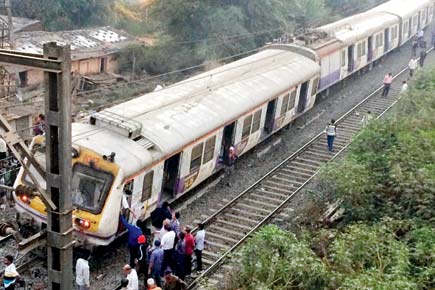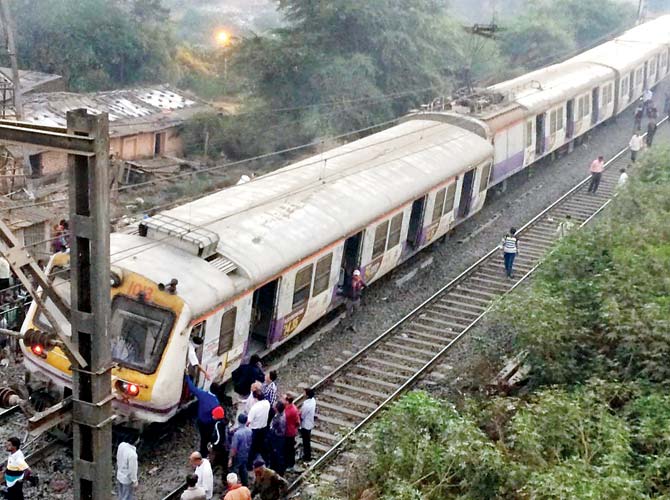Sources said that the stones required to ensure a tracks stability are insufficient, and may have led to the rail fracture that caused the incident on the Kalyan-Vitthalwadi route


Five coaches of the Kurla-Ambernath train derailed yesterday
The Indian Railway is busy providing Wi-Fi at railway stations, but when it comes to tackling more serious issues, it seems that it has gone off-track. The derailment on the Kalyan-Vitthalwadi route yesterday, apparently due to a rail fracture, once again shows the laxity of the Central Railways. Unlike the reason ‘cold weather’ given every time, sources said that the cushion required for ensuring track’s stability – ballasts or stones - is insufficient, and this could also have lead to a rail fracture causing the derailment.
ADVERTISEMENT
According to senior rail officials, the Mumbai Division of Central Railway (CR) is not maintaining their network properly. Ballasts or stones, are placed between the rail tracks, which are joined by concrete sleepers. These ballasts act like a spring and a cushion for passing trains. With enough ballasts, the tracks can give good support for trains to run at high speeds.
“Under the given circumstances, the existing tracks should be filled with 250-300mm ballasts. But then there is hardly 100mm of ballasts present on tracks,” said a senior CR official. If sources are to be believed, then on an average, in a year 1.5 lakh cubic mm of ballasts need to be put on tracks but then less than a lakh cubic mm of ballasts are used.
This means that the rail lines don’t provide sufficient cushion to trains, and that is the reason why when a train is at a good speed it jumps. This also puts pressure on the tracks due to the friction between the metals – track and wheels of the train – plus the cold weather, can also lead to rail fractures.
The officials also claim that on Kalyan-Vitthalwadi and Kalyan-Shahad routes, there is issue of garbage littered on tracks, apart from poor drainage network that results in water passing below the tracks, leads to soil erosion. It also affects the quality of rails which already is apparently not up to the mark.
The derailment
Thursday’s derailment led to cancellation of nearly 175 train services on the main line of CR while the trains were running late by 10 minutes on an average. “We also operated more than 66 special services between Karjat and Ambernath,” said AK Jain, spokesperson, Central Railway.
The derailment of the Kurla-Ambernath train took place at 5.53am, wherein 5 coaches derailed and its impact was such that it uprooted an OHE (over head electrical line) pole. The speed of the train was around 15kmph and due to a level crossing between the two stations; there is no scope for running it faster. Sources who went to the spot said that the rail had broken into two pieces which also shows its core quality. The Kalyan-Vithalwadi Down track was declared safe at 4.30pm and the first special local from Kalyan to Karjat left at 4.42pm.
President of the Kalyan-Kasara/Karjat Passengers Association, Rajesh Gangav slammed railway authorities for not doing enough to maintain the tracks.
“There is no proper supervision and inspection by senior railway authorities. The condition of railway tracks is not good. Luckily, the train was running at slow speed and no one was injured, otherwise it could have been a disaster,” Gangav said. Early this month, angry commuters had blocked tracks at Titwala station due to delays.
 Subscribe today by clicking the link and stay updated with the latest news!" Click here!
Subscribe today by clicking the link and stay updated with the latest news!" Click here!







